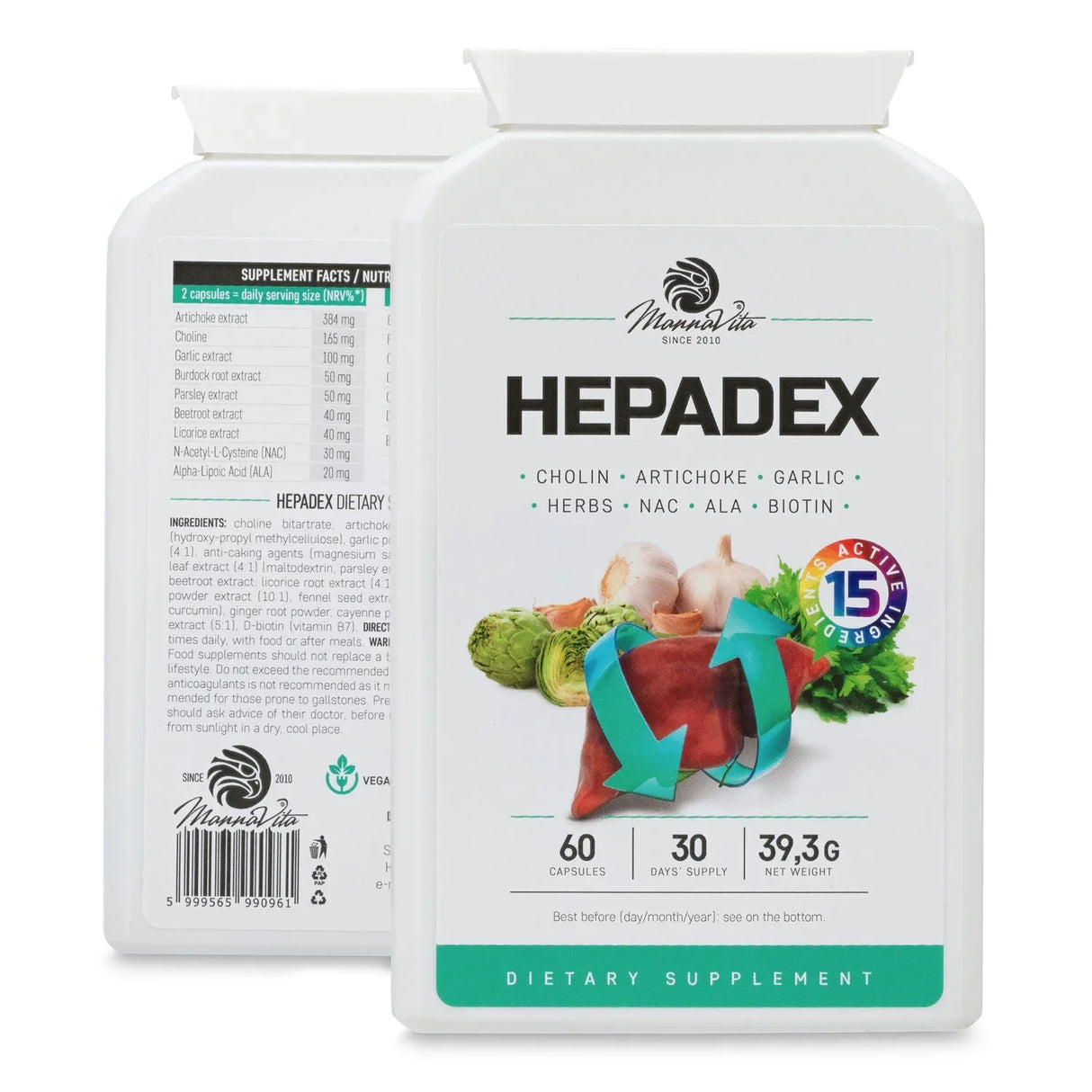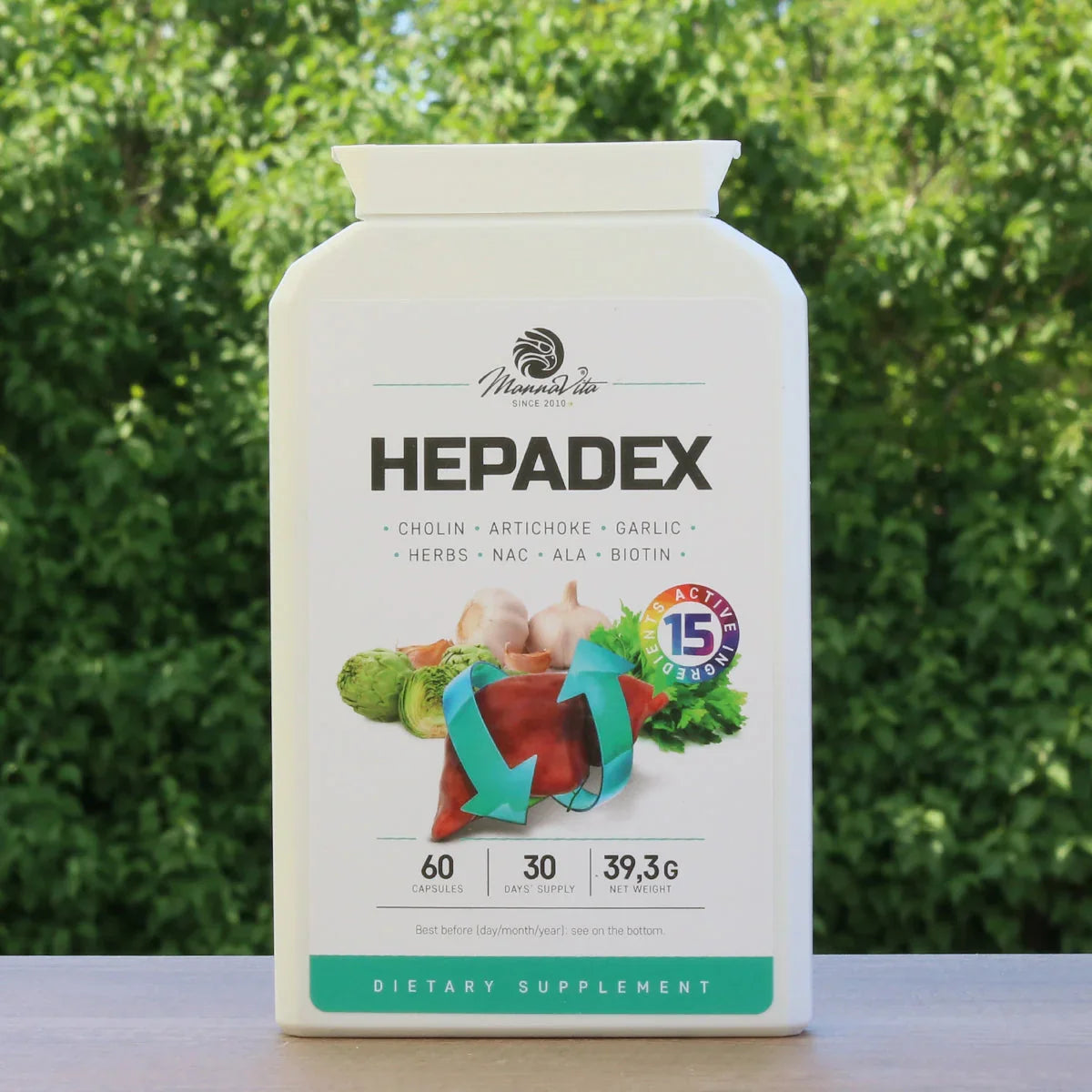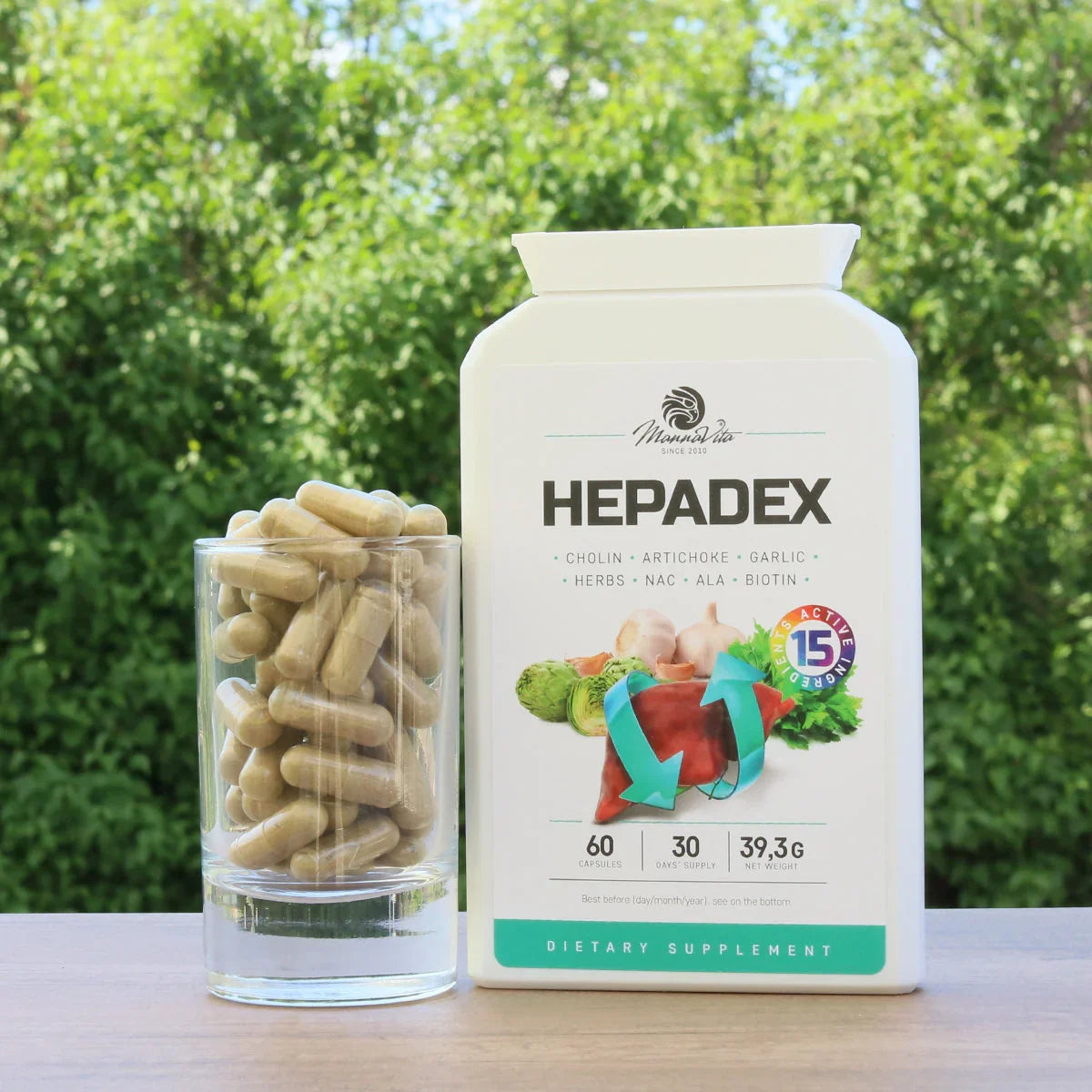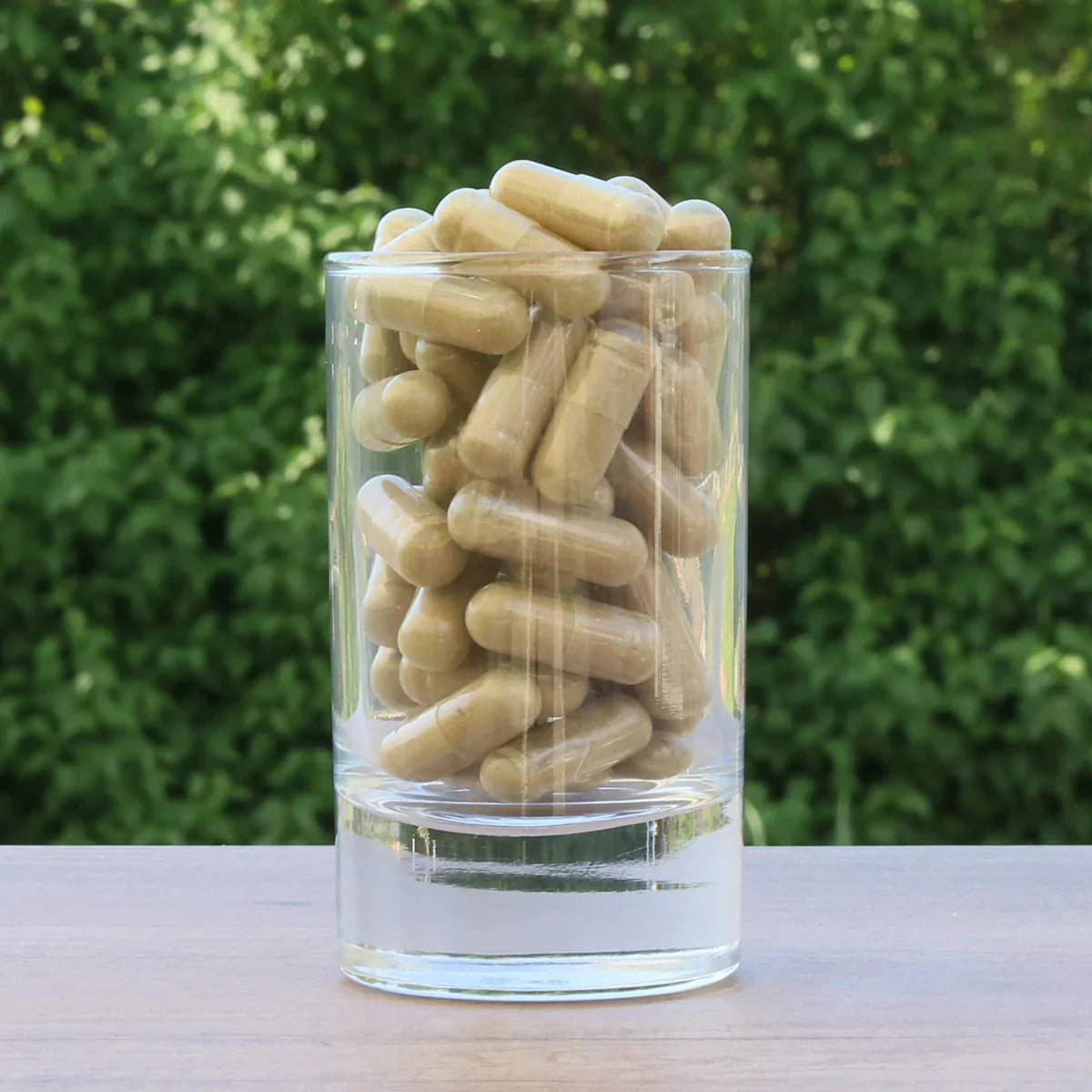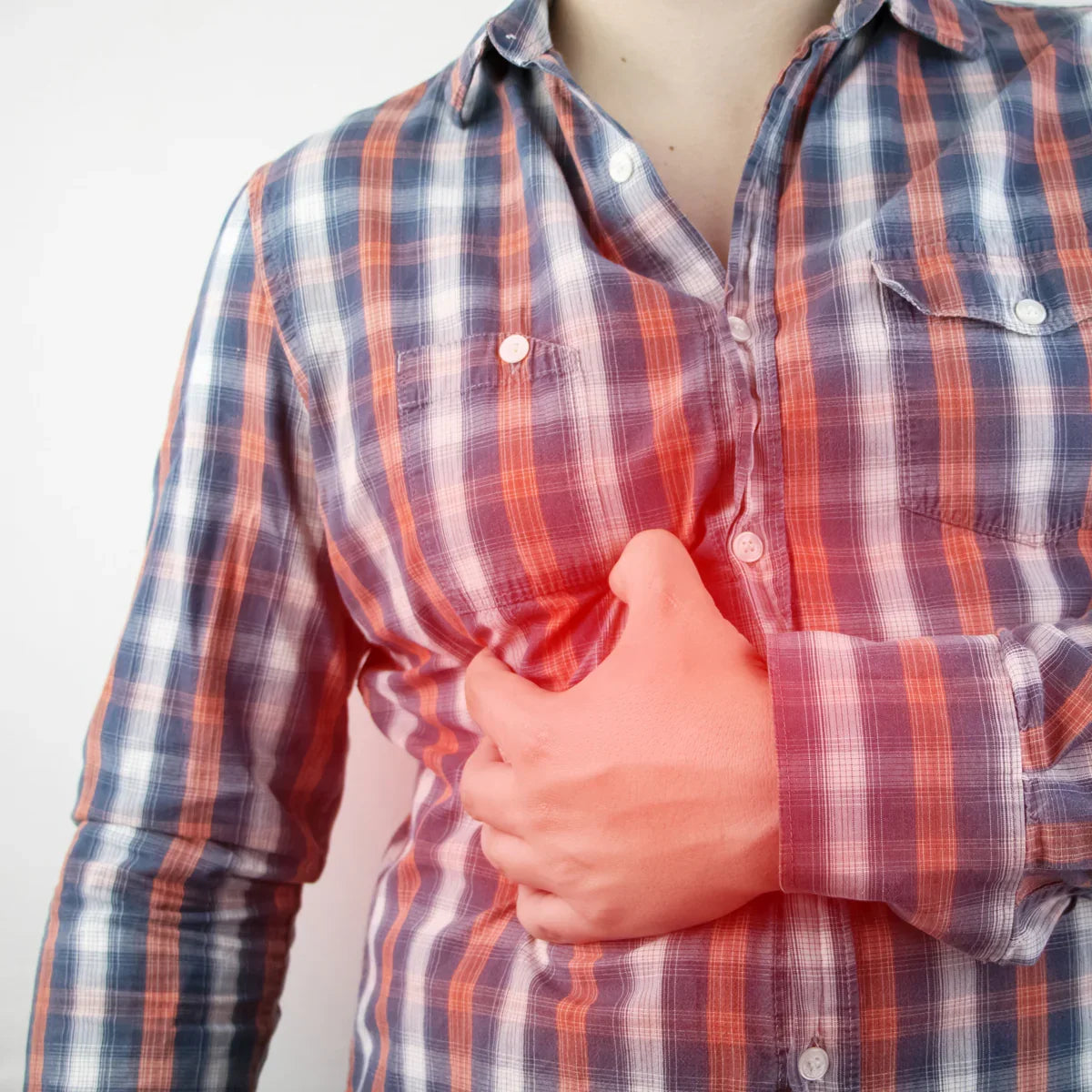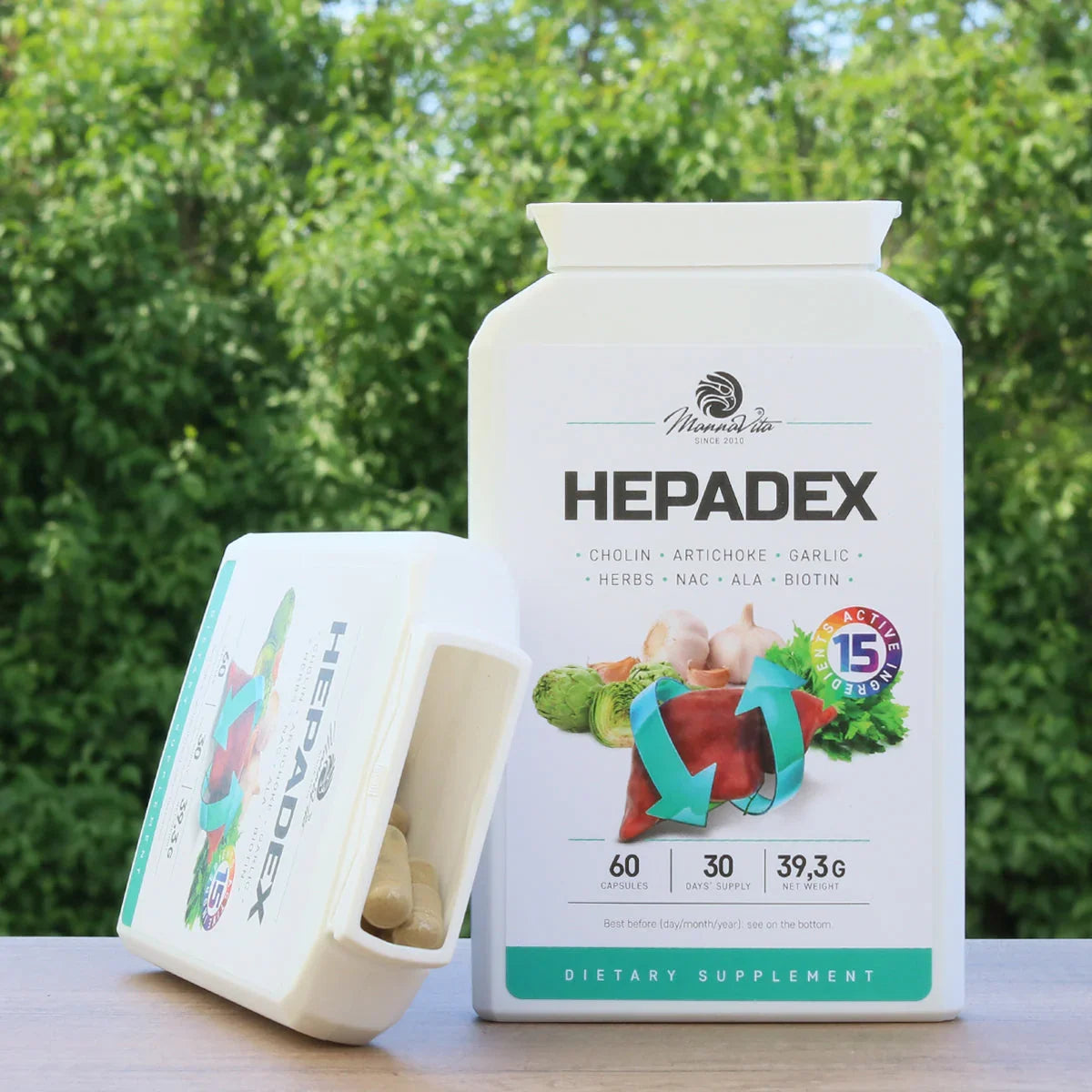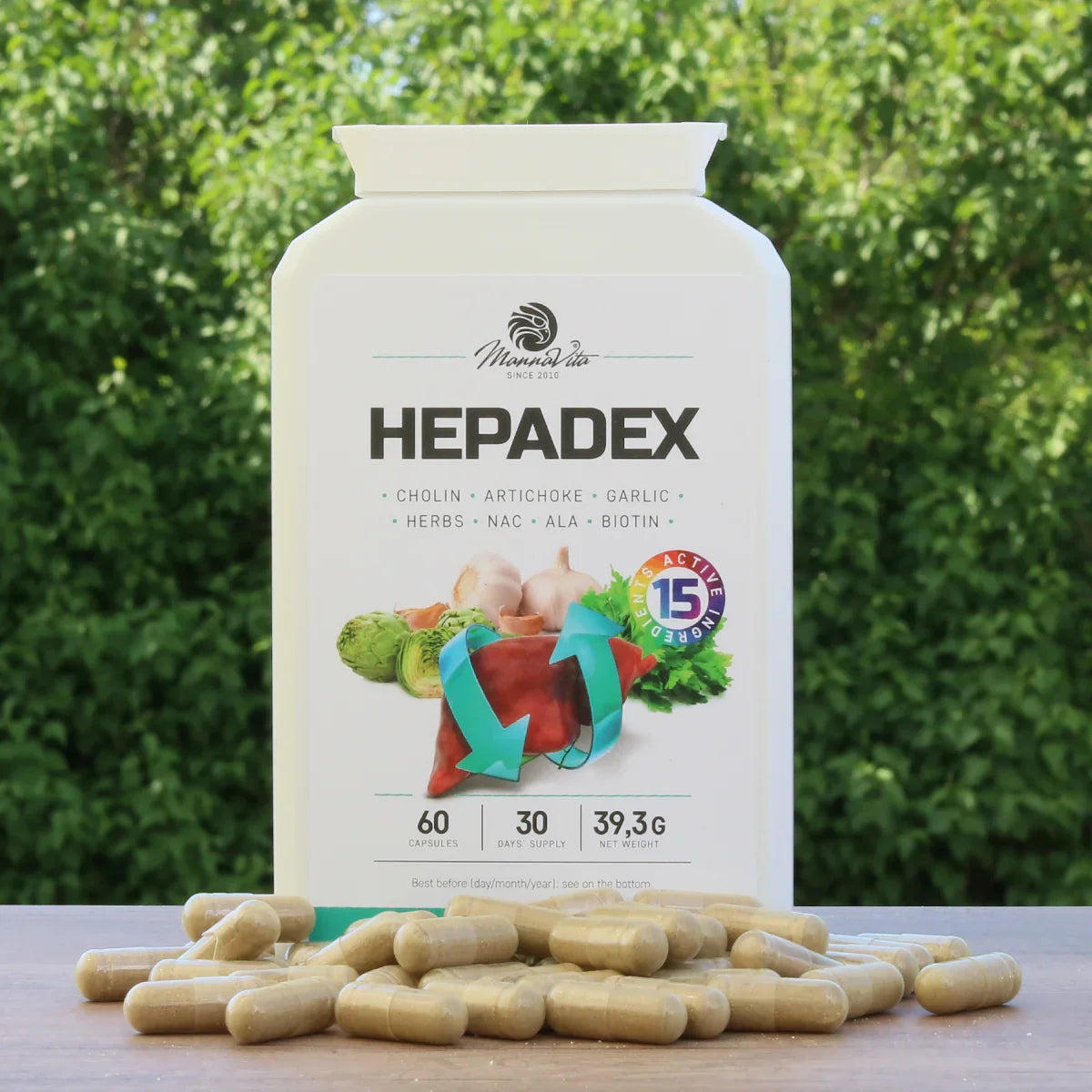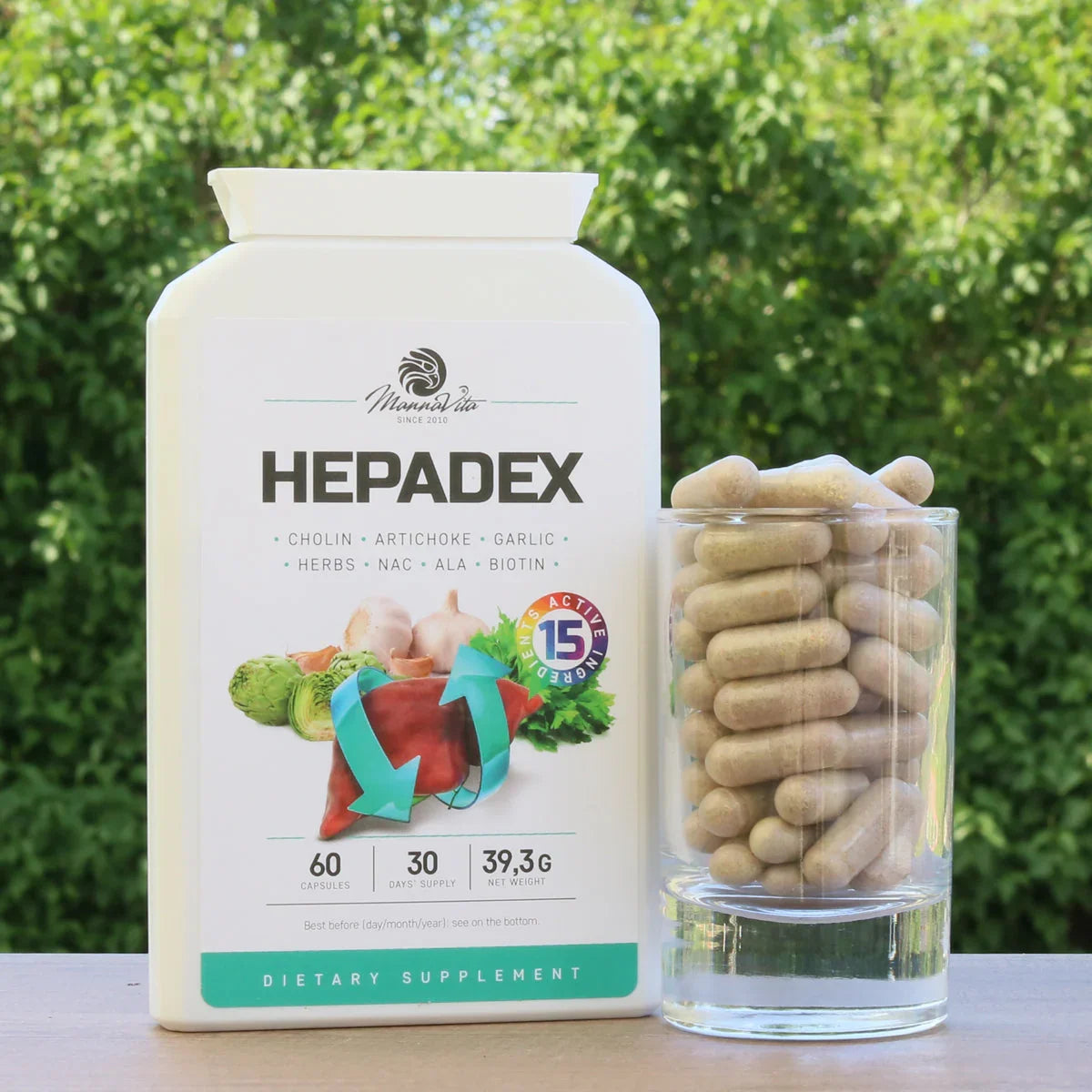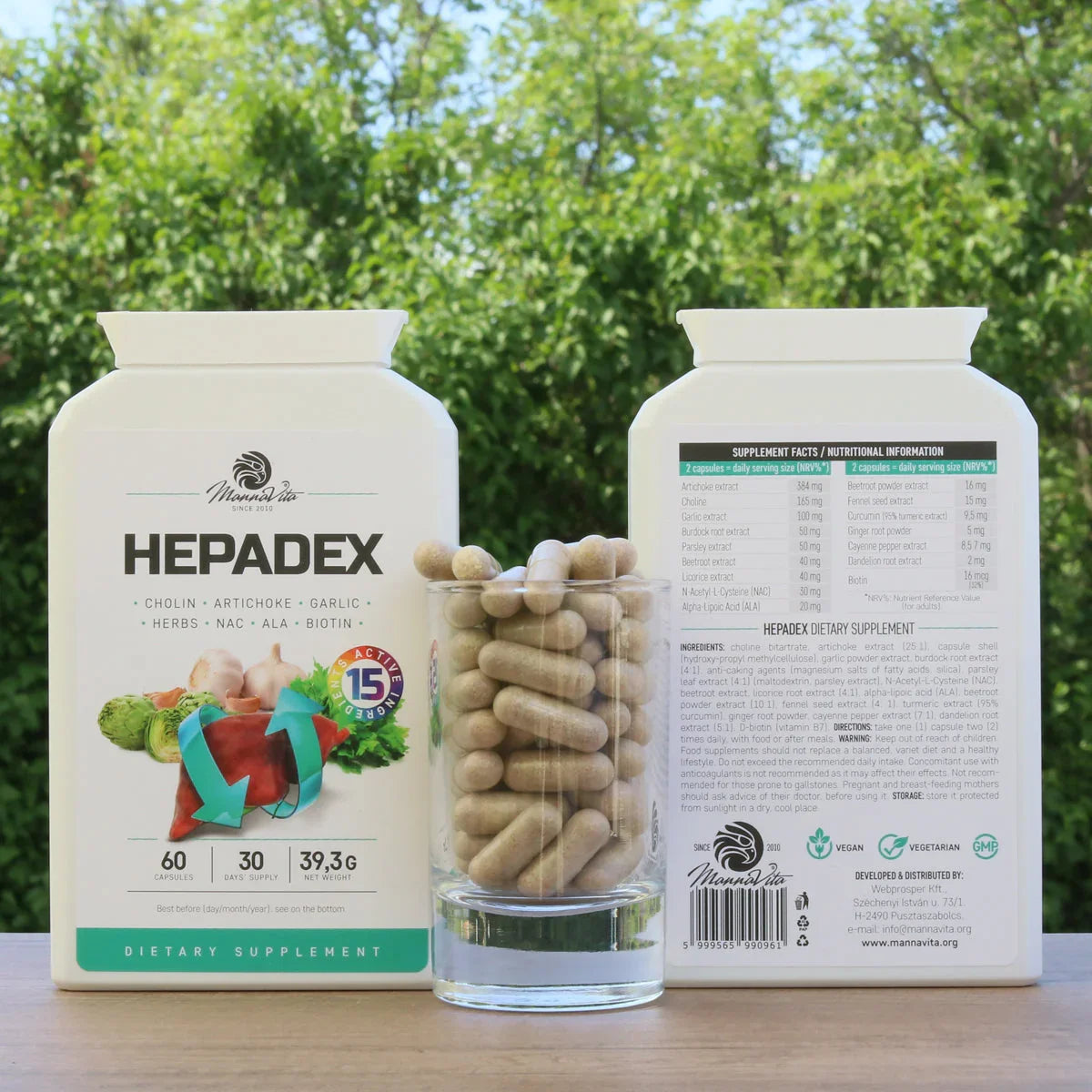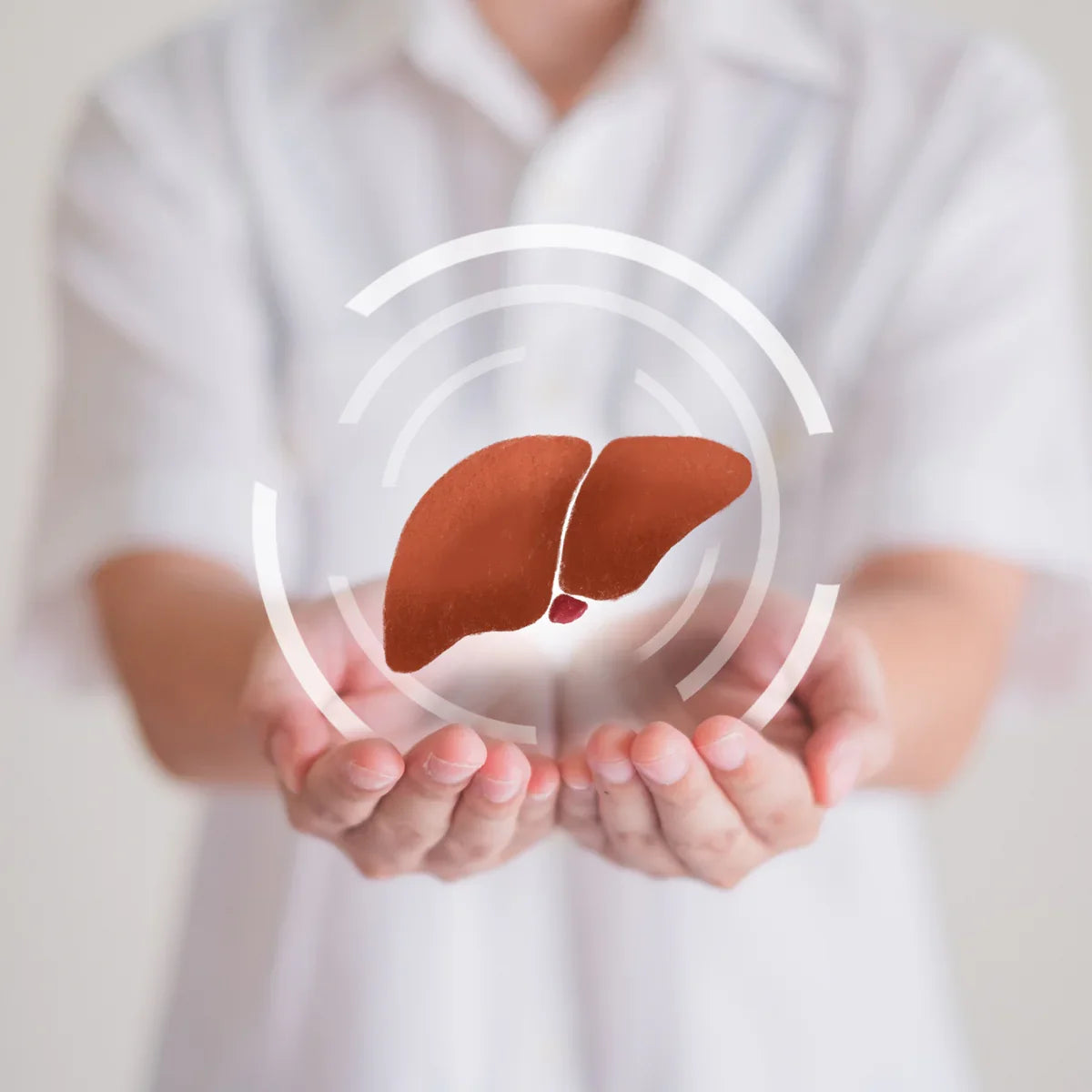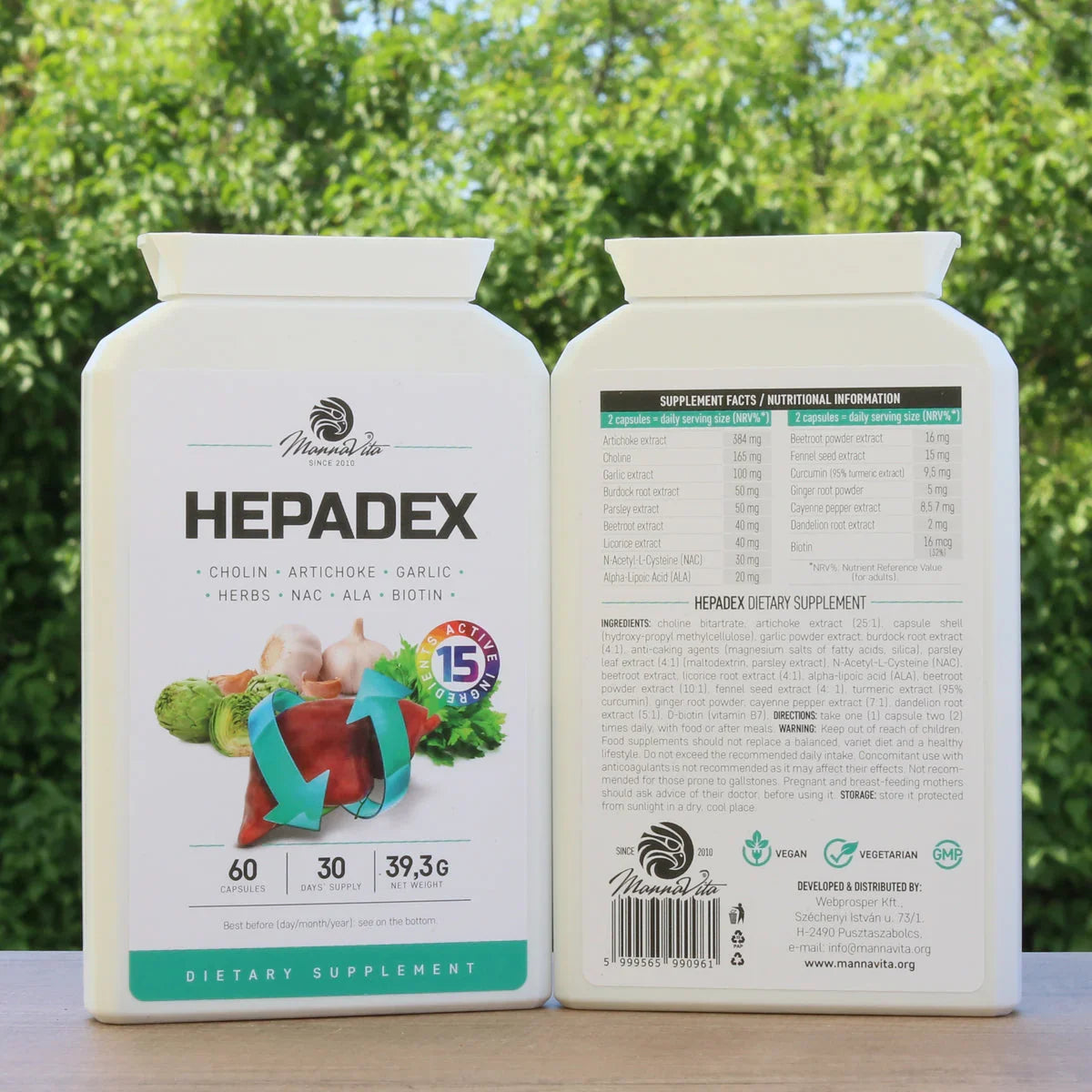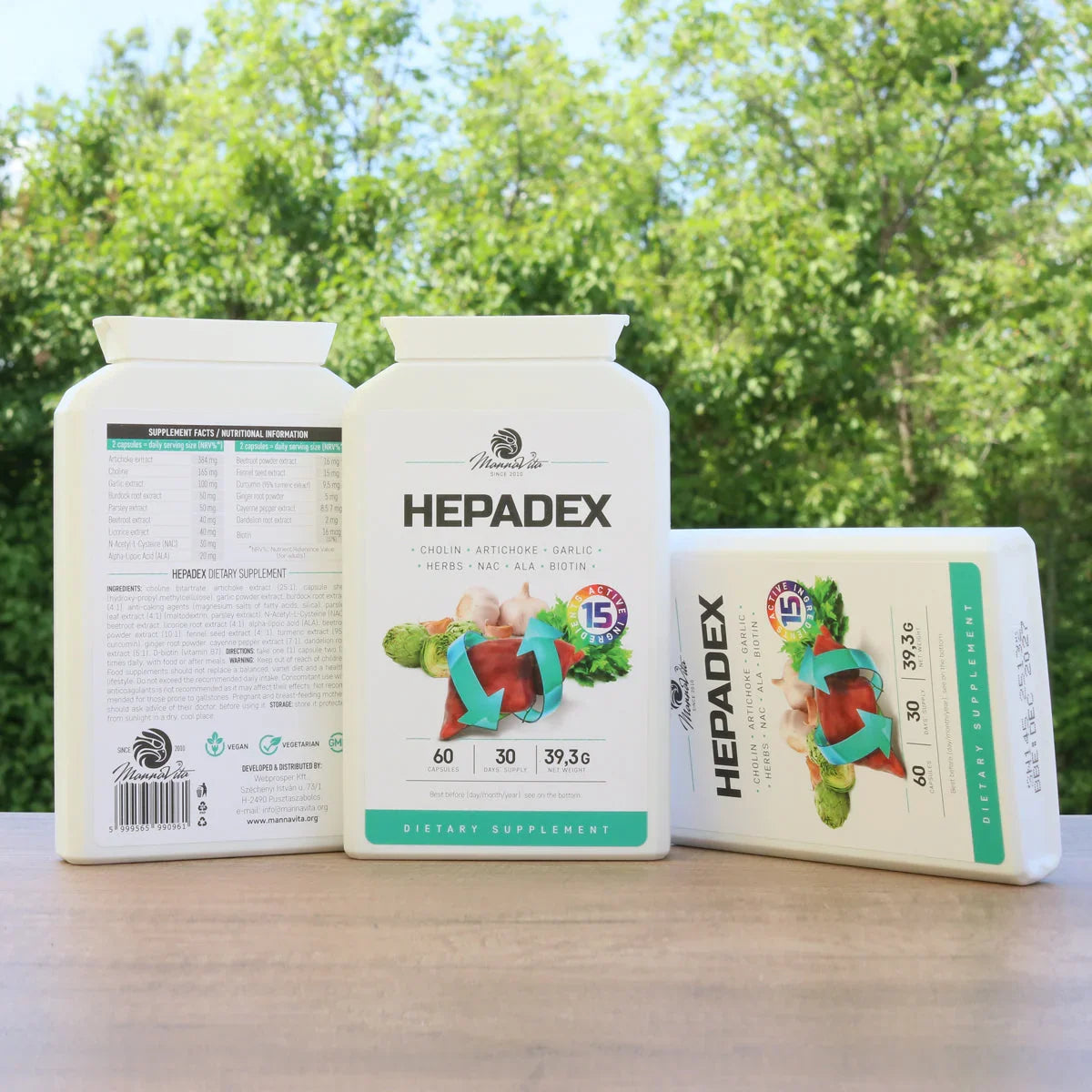HEPADEX liver-regenerating and liver health-improving complex • 60 capsules
Fast Shipping
FREE shipping over 99€
FAST delivery from stock.
Guarantee
30 days Money Back Guarantee!
Payment options


Hepadex is a liver-regenerating complex containing choline, artichoke, herbal extracts, NAC, and ALA. A well-designed complex with 15 natural active ingredients that improve liver function, strengthen the liver, and support liver regeneration.
Taking Hepadex is particularly recommended in the following cases:
- Weak liver function
- Diabetes
- Hypothyroidism
- Fatty liver
- Liver cirrhosis
- For detoxification purposes
| Packaging: | 60 pcs. |
| Form: | capsules |
| Serving size: | 2 |
| Servings per product: | 30 |
☀ How to use - for Adults: 2 capsules daily with plenty of water.
☀ How to use - for children under 14 years of age: 1 capsule daily with plenty of water.
The product can be taken continuously without interruptions.
Storage: Store in a dry, light-protected place at a temperature below 25 °C.
Supplement Facts:
Active ingredients in the recommended daily amount = 2 capsules:
| Amount / serving | % Daily Value* | |
| Choline: Choline bitartrate | 165 mg | ** |
| Artichoke Extract: 25:1 ratio | 384 mg | ** |
| Garlic Extract | 100 mg | ** |
| Burdock Root Extract: 4:1 ratio | 50 mg | ** |
| Parsley Extract: 4:1 ratio | 50 mg | ** |
| NAC: N-Acetyl-L-Cysteine | 30 mg | ** |
| Beetroot Extract & Beetroot Powder: 10:1 ratio | 40 mg | ** |
| Licorice Root Extract: 4:1 ratio | 40 mg | ** |
| ALA: Alpha Lipoic Acid | 20 mg | ** |
| Fennel Seed Extract: 4:1 ratio | 15 mg | ** |
| Turmeric Extract: 95% Curcumin | 9,5 mg | ** |
| Ginger Root Powder | 5 mg | ** |
| Cayenne Pepper Extract: 7:1 ratio | 8,5 mg | ** |
| Dandelion Extract: 5:1 ratio | 2 mg | ** |
| Biotin: Vitamin B7 | 16 mcg | 32% |
* DV%: Percentage of recommended daily intake, according to EU Regulation No. 1169/2011
** The daily recommended amount is not defined.
The effects of choline on the liver

Choline is a macronutrient classified as part of the B-complex vitamins. It is essential for proper liver and brain function, ensures the health of the nervous system and muscles, and maintains normal metabolism. [01.]
As a lipotropic substance, choline prevents fat accumulation in the liver and gallbladder, protecting the liver. Choline emulsifies fats and cholesterol, preventing their deposition in the liver, gallbladder, and blood vessels.
Choline protects the liver, helps it perform its detoxifying function, and reduces harmful effects in cases of extreme stress (e.g., alcohol, drugs).
The effects of artichoke extract on the liver

The detoxifying effect of artichoke is enhanced by cynarin, a powerful blood purifier. This compound strengthens the liver and accelerates bile flow. This is essential for breaking down fats and properly absorbing vitamins.
Artichoke alleviates liver disorders caused by toxins and promotes liver cell regeneration. A 1940 study conducted in Japan showed that artichoke not only reduced blood cholesterol levels but also increased bile production in the liver and had a diuretic effect.
In 1993, researchers confirmed its beneficial effect on bile function, stating that artichoke's main effects include maintaining bile production and its normal composition, increasing bile production, and making bile more fluid. It promotes bile duct contraction, eliminating biliary atony, gallbladder inflammation, irregular gallbladder contractions, and digestive complaints caused by bile disorders. [02.]
10 conditions when we recommend using Hepadex
| ✓ Fatty liver |
| ✓ Weakened liver |
| ✓ Diabetes |
| ✓ Liver detoxification purposes |
| ✓ Gallbladder problems |
| ✓ Liver cirrhosis |
| ✓ Drug detoxification |
| ✓ Hypothyroidism |
| ✓ Nicotine addiction |
| ✓ Alcohol addiction |
The effects of garlic extract on the liver
Garlic is rich in sulfur-containing compounds that activate liver enzymes, enabling the liver to function more efficiently. As a result, toxins are eliminated from the body faster and more effectively.
Garlic has a positive, cleansing effect on the liver. Dried garlic extract is part of medications used for liver, gallbladder, and chronic constipation issues.
The effects of burdock root extract on the liver
The active ingredients of burdock root stimulate bile and liver function, making the herb excellent for detoxification treatments. Its detoxifying properties are further enhanced by its ability to increase sweating and improve urine flow, aiding toxin elimination. [03.]
Hepadex properties
| Synergistic effect | yes |
| Easy to swallow | yes |
| Rapidly absorbed | yes |
| High active ingredient content | yes |
| Made with a gentle process | yes |
| No Unnecessary Binders | yes |
| GMO-free | yes |
| Keto-friendly | yes |
| Paleo-friendly | yes |
| Low Carb diet | yes |
| Fasting | yes |
| Vegan / Vegetarian | yes |
| High blood pressure | yes |
| Diabetes | yes |
| Autoimmune Diseases | yes |
The effects of beetroot on the liver
One of the most important active ingredients in beetroot is betaine, which supports liver cell function and helps break down toxins. Betaine promotes fat breakdown, reducing the risk of developing fatty liver.
The effects of beetroot’s active ingredients on the liver

The active ingredients in beetroot stimulate the liver’s natural detoxification processes by increasing bile production and secretion. Bile plays an essential role in fat breakdown and digestion while also helping to remove toxins from the body.
Due to its high antioxidant content, especially betalains, beetroot strengthens the liver against oxidative stress, which can be caused by environmental toxins, alcohol, or processed foods.
Another important compound in beetroot is nitrate, which helps dilate blood vessels and improve circulation. With better blood flow, the liver can more effectively filter out harmful substances while receiving improved oxygen and nutrient supply. This is particularly important for individuals suffering from liver damage or hepatitis, as proper circulation supports regeneration. [04.]
The effects of NAC - N-acetylcysteine on the liver
NAC is a highly beneficial compound for maintaining liver health. It helps break down toxins, reduces oxidative stress and inflammation, and supports liver cell regeneration.
NAC is one of the strongest antioxidants, acting as a precursor to glutathione. Glutathione is one of the liver’s most crucial protective mechanisms, helping to break down and neutralize harmful substances. The liver is exposed to significant oxidative stress when breaking down environmental toxins, alcohol, and medications (such as paracetamol), but glutathione helps neutralize free radicals, reducing liver cell damage.
NAC is particularly effective in preventing and treating acute and chronic liver damage. It helps restore glutathione levels, allowing the liver to detoxify toxic substances faster, preventing severe organ damage. It also has anti-inflammatory properties, which may be beneficial for conditions like non-alcoholic fatty liver disease (NAFLD) and hepatitis. [05.]
The effects of ALA - alpha-lipoic acid on the liver
Alpha-lipoic acid (ALA) is a powerful antioxidant that neutralizes free radicals produced in the liver during detoxification, protecting liver cells from potential damage. Since ALA is both water- and fat-soluble, it can provide protection throughout all parts of the cells, making it more effective than many other antioxidants. Additionally, ALA boosts glutathione production.
One of the main causes of non-alcoholic fatty liver disease is insulin resistance and inflammation, which progressively damage the liver. ALA improves insulin sensitivity, reducing blood sugar fluctuations and fat storage in the liver. This helps prevent or even reverse liver fat accumulation and its long-term consequences.
ALA has been proven effective in the removal of heavy metals such as lead and mercury, as it can bind and neutralize these substances before they damage liver cells. Additionally, ALA may help protect the liver in cases where it is overburdened by strong medications (such as chemotherapy drugs) or excessive alcohol consumption. Some studies suggest that ALA can even aid in treating severe liver diseases like cirrhosis, as it supports the regeneration of damaged liver cells. [06.]
The effects of turmeric extract on the liver
The active compound in turmeric extract, curcumin, has beneficial effects on liver health and detoxification processes. Curcumin is a strong anti-inflammatory antioxidant that helps protect the liver from various harmful effects, such as toxins or additives found in processed foods.

Curcumin helps reduce fat accumulation in the liver and decreases inflammation, which is key to slowing fatty liver progression.
It may also improve insulin sensitivity, further reducing the risk of fatty liver disease and supporting the reversal of existing conditions.
Additionally, curcumin supports the liver’s natural detoxification processes by stimulating bile production and secretion. Bile is essential for breaking down fats and digesting nutrients. [07.]
The effects of licorice root extract on the liver
Licorice root (Glycyrrhiza glabra) contains glycyrrhizin, a compound with strong anti-inflammatory and liver-protective effects. Glycyrrhizin helps reduce liver inflammation and oxidative stress, which is important in most liver diseases.
Licorice root may also assist in the treatment of viral hepatitis. Research suggests that glycyrrhizin can inhibit the replication of certain viruses, such as hepatitis C, and reduce liver inflammation. For this reason, licorice root extract is used as a complementary treatment for chronic hepatitis in some countries.
Beyond this, licorice root supports liver cell regeneration and may help reduce fibrosis, which refers to scarring of liver tissue.
The effects of dandelion on the liver
Dandelion (Taraxacum officinale), especially its root, has been known for centuries for its liver-cleansing and detoxifying effects. One of dandelion’s most important properties is its ability to stimulate bile production and secretion, which aids the body’s natural detoxification processes. Dandelion is particularly beneficial for those with fatty liver or digestive issues.
Dandelion is rich in polyphenols and flavonoids, which act as antioxidants that neutralize free radicals. These free radicals can cause liver cell damage and inflammation, which is particularly important for individuals exposed to toxic substances such as alcohol or medications. [08.]
Warnings: Dietary supplements do not replace a balanced diet and a healthy lifestyle. Keep out of reach of children. Do not exceed the recommended daily dose.
Related research and publications:
- Choline Metabolism Provides Novel Insights into Non-alcoholic Fatty Liver Disease and its Progression – DOI: 10.1097/MOG.0b013e32834e7b4b
- Efficacy of Artichoke Leaf Extract in Non-Alcoholic Fatty Liver Disease: A Pilot Double-Blind Randomized Controlled Trial – DOI: 10.1002/ptr.6073
- Hepatoprotective Effects of Arctium Lappa Linne on Liver Injuries Induced by Chronic Ethanol Consumption and Potentiated by Carbon Tetrachloride – DOI: 10.1007/BF02256533
-
Health issues and physical conditions for which we recommend making it part of the therapy:
-
Digestive systemDuring a liver-protective diet • Liver Cirrhosis • Liver cancer • After gallbladder removal • Gallstones
-
Brain, Nervous SystemMemory loss
-
Metabolism & EnergySlow metabolism • Hashimoto's thyroiditis • Hypothyroidism • Weakness • Fatigue • Insulin resistance • Type 2 diabetes
-
Immunity, AllergyWeakened immunity
This product can be used during the following diets:
This product contains the following allergens:

